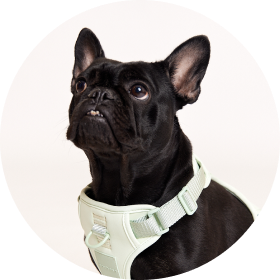- Home
- The Daily Wag!
- Behavior
- Why Dogs React To Your Fear

Common
Normal
Have you ever been scared of something momentarily while walking your dog? Were you surprised to see them react to your fear? Dogs are usually pretty keenly aware of what kind of emotions you're putting off as an owner. This is for a whole batch of reasons. Sometimes it has to do with your smell. Other times it can be your body language or even just the expressions on your face. While your dog is always paying attention to you, the reactions you can provoke from them when you're afraid of something tend to be a little different, and oftentimes a little more severe. If you are curious as to what may be bringing this on, read on below to gain some insight into this reactionary behavior.
So the first question you may be asking is, can my dog actually sense fear? The answer to this particular question is unequivocal yes. One major reason that they possess this ability is that of their hypersensitive sense of smell. Yes, dogs can actually smell fear. Or rather, they can smell the scent of our sweat glands kicking into overdrive when we feel anxiety, fear, or tension. These odors can be so prevalent that some dogs will even sense something like an anxiety attack prior to you even sensing it's creeping up on you.
Body language is another large contributor to your canine's amazing ability to detect your fear or other negative emotions. A canine can pretty immediately pick up on an animal or person that is afraid of them, which in turn flips a whole bunch of different behavioral mechanisms in their own brain. An issue related to this is staring, which humans tend to do whenever they are feeling trepidation or fear towards an animal or object. Canine instinct automatically perceives this behavior as confrontational, which can potentially lead to some tense situations. And logically, someone afraid of dogs is not too aware of how to read them either.
A great way to circumvent a dog who has accidentally perceived you to be a threat is to become more familiar with how to conduct yourself around them. Avoid making prolonged eye contact, and try not to make any sudden movements. If possible, also refrain from raising your voice or exclaiming. Getting aggressive physically will only serve to kick in the dog's survival instincts, at which point options can really become limited. If they are occupying space ahead of you, it is best to not look directly at them and give them a wide berth. Proper training is yet another way to help avoid any conflicts like the one described above.
Need advice about your pet's health?
Get answers fast from a veterinary professional 24/7 in the Wag! App.
Get Vet ChatSo, now you know that dogs can sense fear, you are probably asking if they can sense other emotions, like happiness. Animal behaviorists have been arguing about this for years. Some of them argue that logically if we see behaviors regularly associated with different moods of dog owners, it would stand to reason that they are connected. If there are mechanisms that exist for your canine companion to detect fear, then certainly other, similar mechanisms exist to display happiness.
The flip side of this argument is that most canines recognize reward-based scenarios, and their reactions to positive emotions can be chalked up to more or less a trained or learned behavior. The idea here is that, because dogs don't have a true sense of identity or "self," they cannot comprehend complex emotions that require a greater empathetic awareness in regards to human beings, whose emotional spectrum tends to be far more nuanced. However, a lot of dog owners would argue that they see these types of complex behaviors in their dogs all the time, especially ones like jealousy or love. Individuals who own more than one dog tend to be firmly rooted in the "my dog knows whats up" camp, as these complexities tend to be more obvious with additional dogs.
An important facet of this situation that dog owners should think about is whether or not your dog becomes scared when he feels your fear. Are you creating an emotionally toxic environment that your canine companion is feeding off of? A great way to discern this is to keep a critical eye focused on your dog's demeanor. This is a regular practice that can really help you to learn your dog's specific movements and warning signs. If you can circumvent emotional or psychological problems such as separation anxiety prior to them occurring, it will only serve to aid you in keeping your animal healthy and happy.
Your dog is always going to be focused on your demeanor. And as a dog owner, it is important to remember that your canine can feed off of your emotions and suffer on your behalf. It is critical to present a confident facade with your dog so that he maintains his own confidence and maintains his general health. Remember, you want a dog, not a scaredy cat!
Written by a Pug lover Shane Langenfeld
Veterinary reviewed by:
Published: 03/02/2018, edited: 01/30/2020
More articles by Shane Langenfeld

